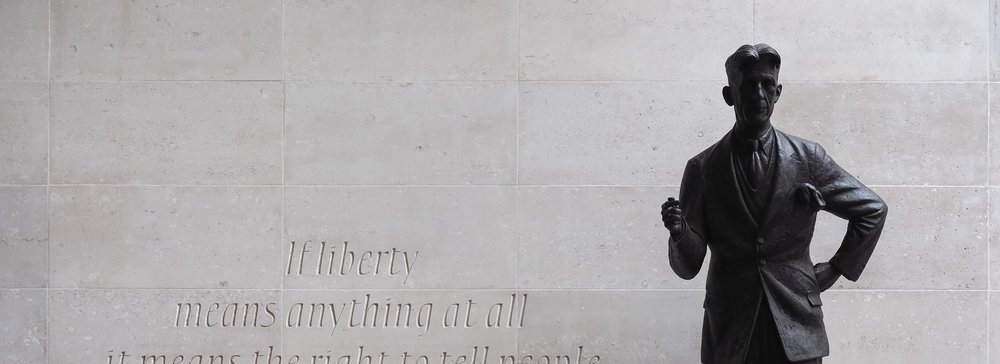| 7 mins read
Few writers are as clear and as misunderstood as Orwell: the simplicity of his writing belies the complexity of his ideas. As a result, Laura Beers argues, he has been ripe for deliberate misinterpretation and wilful misappropriation. Orwell's Ghosts assesses Orwell's understanding of free speech and condemnation of authoritarianism in the context of his wider writing. It seeks to explain the origin, contemporary significance, and ongoing relevance of his thinking. This concise study steers a careful course through some of the most complicated issues of his time and our own. It is a book based on a course which Beers has taught on both sides of the Atlantic, and the concerns and critiques of her students echo through its pages.
Few figures have such appeal across the political spectrum—surely there cannot be another democratic socialist beloved by Reagan and Trump—and Beers sets out to examine the sources of this fascination, chipping away at the falsifications which would have so disturbed a writer rigorously committed to honesty. Beers explains why Orwell's principles are debauched by those who cry ‘Orwellism’ the moment they are not allowed to say exactly what they want, when they want, where they want, as loudly as they want. ‘Orwell's commitment to objective truth explains why he describes the essence of freedom in Nineteen Eighty-Four as the right to say that 2+2 = 4, not the right to say that 2+2 = 5 … Orwell believed in liberty above all else, but liberty, in his view, was predicated on an assumption of personal and social responsibility’. That personal and social responsibility, she rightly implies, has been sorely lacking from those who take Orwell's name in vain. Further, those who are concerned with Orwell's insistence on freedom of thought frequently betray less interest in his commitment to promoting social justice and eradicating inequality.
But this is not a hagiography. Orwell may have been scrupulous in pursuit of accuracy, but he was hardly free from prejudice. Drawing on scholars of imperialism, Beers gives us Orwell the critic of empire who was also a devout patriot: a man who hated imperialism, but whose work is littered with casual racial stereotyping. She also follows in the footsteps of those who have been critical of his ‘slumming’ through Down and Out in Paris and London. But her staunchest criticism is reserved for the ‘misogyny and sadism’ which striates Orwell's work. This has been a common charge by feminist readers in recent years. There are, as Beers notes, numerous instances of sexual violence throughout his books, though Orwell would not have recognised them as such. Beers particularly focusses on his horror of abortion through a close reading of Keep the Aspidistra Flying. This squeamishness, she suggests, reflects a wider lack of respect for women's bodily autonomy and agency. It is only possible to claim that he reflected the attitudes of his time by ignoring the many people ‘male and female [who] did think critically about the mechanics of patriarchy and the place of women in their society’. Orwell was, after all, a contemporary of Ellen Wilkinson—the subject of an excellent biography by Beers herself—who was as critical of patriarchy as she was of class inequality and imperialism.
At the same time, Beers argues, dismissing Orwell—on these or any grounds—‘risks throwing the baby out with the bathwater’. Not only is there a great deal to learn from his writings, interrogating these aspects of his life and work serves as a reminder of ‘the long, embedded history of sexual harassment and predatory behaviour even among those who believe themselves to be enlightened and on the right side of history’. By extension, such attitudes reveal the lack of interest in equalising gender relations among many men deeply committed to class inequality and the social democratic project. Orwell's unquestioned reliance on the women in his life, and the assumption that they would undertake the domestic labour which facilitated his career, was mirrored in the founding of a welfare state which also rested on the unpaid labour of women.
This is a compact, but ambitious book, looking to the left and right in both Britain and America, and occasionally further afield. This can sometimes be dizzying in speed and range. The chapter on inequality takes us from Hugh Grant to Gwyneth Paltrow via Thomas Piketty, Elizabeth Warren, and Jamie Oliver. Beers reiterates several times that this book is not an attempt to predict Orwell's responses to contemporary issues and events. There are dangers, she points out, in asking #WhatWouldOrwellDo? Understandably, though, in places she is not able to resist reflecting what he might have made of contemporary events, from the rise of populism and the development of social media to the impact of Covid-19.
Orwell's Ghosts will surely direct many readers towards The Road to Wigan Pier, Homage to Catalonia and The Lion and the Unicorn, as well as to renewed readings of the pair of books which have made and limited his reputation. As Beers suggests, readers whose acquaintance with Orwell comes only from half-remembered school readings of Nineteen Eighty-Four and Animal Farm may well gain a misleading impression of ‘a cold warrior, an anti-communist crusader against thought policing and dictatorial repression’. Here instead is an attempt to use ‘Orwell's writing on the interwar decades to gain a clearer understanding of our own political moment’. Beers proves an adept guide to Orwell's turbulent times which so alarmingly anticipate our own.
Orwell's Ghosts: Wisdom and Warnings for the Twenty-First Century, by Laura Beers. Hurst. 240pp. £20
Need help using Wiley? Click here for help using Wiley







